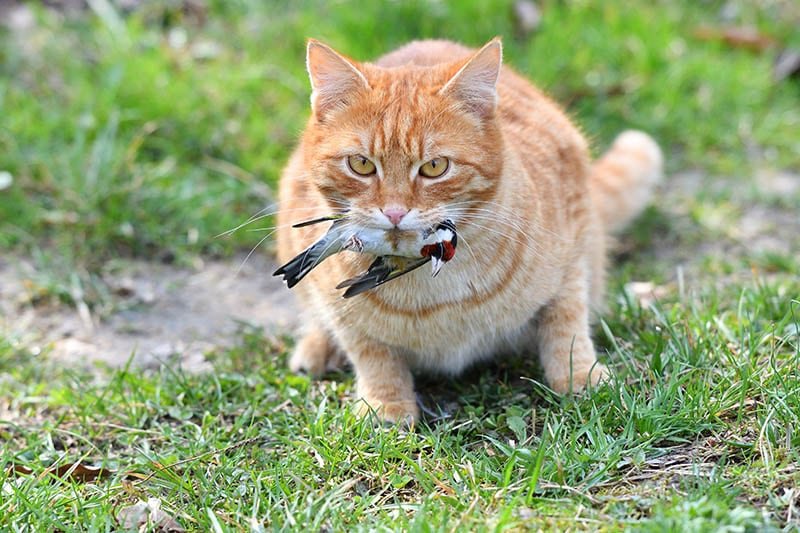Keeping cats indoors

I’m distraught, due to the number of felines roaming our neighborhood and killing our chipmunks, and yes, our birds.
As many of you know, my husband and I enjoy watching these tiny cousins of the squirrel. We love seeing them scurry across our deck in search of their favorite treats of peanuts and sunflower seeds and ducking in and out of the “chippie cup”. And of course, my biggest delight is having them eat from my hands and feeling their teeny, padded feet against my skin. We look forward to it every day. But for the last few weeks, we see their numbers rapidly declining due to neighborhood and feral cats.
We no longer see, Chippie, Tanner, No-Tail, and Fluffy… and not only that, but many of our backyard birds have been attacked by roaming cats. Yes, they have short lifespans (2-5 years), but they all disappeared within weeks of each other, and we found bloody evidence just two weeks ago.
I know that many of you think of chipmunks as a nuisance, and therefore can’t appreciate our connection with these minute creatures, but there are an equal number of us, who enjoy their company and the comfort they bring us. Some of us are fond of cats, some to dogs, others to iguanas or turtles, but for those of us who have no indoor pets, tamias striatus (the scientific name for the eastern chipmunk) and a wide variety of avian life, fulfill our days.
Supporting our viewpoint, numerous conservation organizations, as well as veterinarians, advice cat owners to keep their beloved pets indoors, not only for the benefit of wildlife, but also to protect your fur kids, as it’s shown to extend the life of your cat.
American Bird Conservancy says, domestic cats (Felis catus) can make wonderful pets. But cats that roam outdoors, can have serious consequences.
Across the globe, cats have been introduced into new habitats by people with terrible results. Outdoors, cats are a non-native and invasive species that threaten birds and other wildlife, disrupt ecosystems, and spread diseases.
Now numbering well over 100 million in the United States, cats kill approximately 2.4 billion birds every year in the U.S. alone, making cat predation by far the largest source of direct, human-caused mortality to birds.
For cats, the great outdoors are anything but great, states Paws.org. Whether they live in the city, in the suburbs, or in the country, outdoor cats face a multitude of risks. They are exposed to contagious diseases, most of which are fatal. Traffic takes a huge toll on free-roaming cats, and while many people believe their pets are street-wise, no cat looks both ways when being chased by another animal. Further dangers include poisons, leg-hold traps, pet theft, and inhumane treatment by cruel people.
Outdoor cats cause problems, too. They dig and defecate in neighbors’ yards, and as predators, they injure and kill a significant number of wild animals. Cats cannot be trained to ignore their natural hunting instincts. The only sure way to safeguard wildlife is to keep cats inside.
Plus, it’s been proven that keeping your kitties indoors, extends their lives. Paws.org states, free-roaming outdoor cats are at risk for a shortened life, while a cat that stays indoors or uses an enclosed catio may live up to 15 years or more. Indoor cats are usually healthier, too, which saves on veterinary bills for treatment of contagious diseases, parasites, and abscesses from fights with other animals. While it is true that cats enjoy sunshine, fresh air, and exercise, they do not need to go outside to be satisfied. Some creative planning on the part of their human guardians can help indoor cats live fully.
Global Stewards – Green Living Hub, gives 20 reasons to keep your furry friend indoors, along with the following warning.
Bird Flu Warning
“…Domestic cats can be highly susceptible to HPAI A (H5N1) virus. Cats that have outdoor access should be monitored to avoid potential exposure to and consumption of dead wild birds.” (source: Newsweek)
What do you do if your cat is already used to the great outdoors? Why, build them a catico!
“Providing cats with outdoor access in enclosures ensures we are good cat owners and good neighbors. It means being responsible for wildlife, responsible for community space, and responsible for the safety of our cats.” Jennifer Hillman, The Humane Society of the United States

While it won’t be easy to make the transition, many sites offer tips on how to help your cats make the change.
And please, spay and neuter your pets!

Leave a Reply
You must be logged in to post a comment.